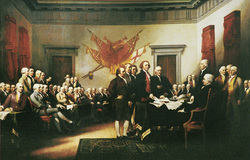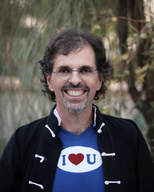 The United States of America carries a deep wound that you and I have the opportunity to heal. This wound can be summarized in one word: slavery. Psychologists like Carl Rogers have understood that individuals cannot attain mental health until their actual self is aligned with their ideal self. The same is true of nations. From its inception, our nation has had a huge rift between its ideal self (“all men are created equal”) and its actual self (a nation built by slaves). Thomas Jefferson was the ultimate embodiment of this paradox. At the time he wrote the Declaration of Independence, he owned more than 100 slaves. Although unwilling to support the abolition of slavery or even to free his own slaves, Jefferson realized the potential ramifications of this practice: “Indeed I tremble for my country when I reflect that God is just (and) that his justice cannot sleep forever.” Whether we call it divine justice or karma, the ripple effects of slavery continue to be felt not just in the U.S. but throughout the entire world. The Fourteenth Amendment to the U.S. Constitution, adopted in 1868 abolished slavery but also opened the door for corporations to be granted the same rights of personhood as former slaves. Like the slave owners of old, modern corporations have put profit ahead of human welfare. But the form of slavery practiced by corporate giants has a far broader reach, extending to every nation and to every living being on this planet. Corporations are privatizing everything that sustains life on Earth, including land, air, water, food, and all other natural resources. And just like slave owners, corporations have no burden of responsibility to their property—only to their profits. The wound that slavery has produced may in fact be lethal. But we still have time to heal this wound. First, we can free ourselves from corporate slavery. This means finding ways to feed, clothe and house ourselves that do not rely on corporations. Not only is it possible to withdraw our energy from an economic system that is destroying life on our planet; it is our sacred duty. The second task, which is equally important, is to offer blessings to all concerned: slave owner and slave, exploiter and exploited, rich and poor. We are all in this together, which is why forgiveness is so crucial. Yes, we can offer forgiveness to those who enslave, but we can also ask for forgiveness for our part in the enslavement process.
2 Comments
9/24/2012 10:23:01 am
I feel like America's biggest karmic test is to live up to our claims of valuing "freedom." It's arguably the highest value in the American mythology - this nation was founded through revolution against tyranny and a rejection of ancienne regime notions of nobility through birth and divine right of kings - we all have an inalienable right to freedom and self-actualization. Yet all through American history we've still had this struggle to walk the talk of freedom - to free ourselves from economic exploitation, to gain equal rights for all... and the institution of slavery was probably the ugliest manifestation of the conundrum. But just as we ended the actual institution (though on other levels de facto slavery continues) the American spirit does seem to be on the path of freeing itself, ultimately; it's our freedom to dream of the impossible that has made this such a dynamic, confident, and creative culture. But there are a lot of institutional and cultural forces trying to erode this spirit. The fear of lack that fuels so many of the personal and larger-scale choices we make in a runaway market-driven society is an anathema to freedom. In a way it seems our freedom is in more danger than it's ever been. Of course that means that the payoff for walking through this challenge could be freedom like we've never imagined!
Reply
Thank you, Dasheya, for your insightful comments. You are so right! Freedom is the core issue here in American life. We live in a country that stands for the ideal of political, religious, and economic freedom. But freedom is ultimately a psychological and spiritual question. How do we free ourselves from the kinds of dynamics that give rise to exploitation, inequality,and injustice? What I admire about someone like Gandhi is his profound understanding that liberation must take place at both an interpersonal and intrapersonal level; the two are inseparable. In our hearts, we can sense that the kind of freedom embraced by great leaders like Gandhi, Lincoln, Mandela, and MLK, is enormous in scope and begins in the heart and mind of each individual.
Reply
Leave a Reply. |
I want to hear from you! Please share your questions and comments. And sign up for my newsletter, where I will pass along the insights, ideas, and inspiration that come my way.
Contact me:Archives
November 2023
|

 RSS Feed
RSS Feed
